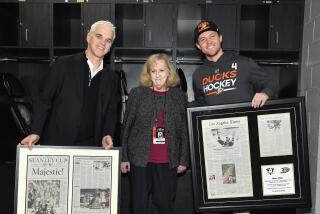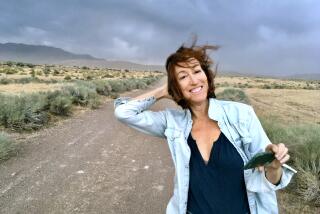Laurie Becklund dies at 66; former L.A. Times reporter, author
- Share via
“They call it Door of the Devil,” wrote Times journalist Laurie Becklund in 1983, “a craggy spot not far from downtown San Salvador where the earth ends, plunging into a sheer, mist-filled ravine.”
Becklund had been reporting from El Salvador for nearly four years and had finished a series of stories that would change America’s perception of the violence ravaging that country.
“It’s always a little foggy,” a former police officer told her, “and there are these big rocks you can stand on top of to throw somebody over.”
The officer worked for one of the country’s intelligence agencies, and his matter-of-fact description of murder was a revelation. The Reagan administration had argued that the death squads were rogue groups with no discernible allegiances, but Becklund proved otherwise.
“No one else was doing this,” said Raymond Bonner, a friend and former New York Times reporter. “Laurie didn’t follow the herd. She stood her ground and spent months investigating the story.”
Becklund, 66, died Sunday at her home in Hollywood of metastatic breast cancer, said her husband, former Los Angeles Times reporter Henry Weinstein.
After a career at The Times, Becklund worked for CBS News. She co-authored four books and was a fellow at the USC Annenberg Center on Communication Leadership and Policy.
“She was born a reporter,” said journalist Barbara Kantrowitz. “Nothing was uninteresting to her, and journalism was the best way to make use of her talent.”
Born in Minneapolis on March 12, 1948, Becklund moved with her family to San Diego as a child. With a degree in English and Spanish from Immaculate Heart College in Los Angeles and a master’s in journalism from Columbia University, Becklund began covering the border for the San Diego Tribune. She joined The Times in 1978.
Among her first assignments was a farmworker strike in the Imperial Valley. At the time, refugees from Central America were struggling to find asylum in the U.S. When smugglers abandoned a group of Salvadorans in the desert, Becklund went to Tucson, where survivors were being held ina jail.
Becklund went to the back of the building and pulled herself up to a window to speak to the men and women inside. Louis Sahagun, now a Times reporter who then worked for the Tucson Citizen, remembers watching as she asked questions, then dropped down to write her notes.
“She was incredibly open-minded,” Kantrowitz said. “She didn’t go into a story knowing an answer. She would dig and dig until she found a truth that was satisfying.”
Her reporting took her to El Salvador where she partnered with Craig Pyes, then of the Albuquerque Journal. Through a former army major, they uncovered the roots of the dirty war being conducted by the Salvadoran military.
After leaving the paper, she co-wrote a number of books, including “Between Two Worlds,” Zainab Salbi’s memoir about her life as the privileged daughter of Saddam Hussein’s personal pilot.
Becklund’s last book, “The Other Side of War: Women’s Stories of Hope and Survival,” captured the experiences of women in six war-torn countries from Afghanistan to Rwanda.
Toward the end of her life, Becklund was still reporting, according to Kantrowitz, untangling the politics of breast cancer.
“She wanted to find out why so much attention was paid to early detection and not to metastatic cancer,” Kantrowitz said.
Besides Weinstein, Becklund is survived by their daughter, Elizabeth Rose Becklund Weinstein; her mother, Elizabeth Larsen; and her sisters Nancy Spencer and Julie Dixon.
More to Read
Start your day right
Sign up for Essential California for the L.A. Times biggest news, features and recommendations in your inbox six days a week.
You may occasionally receive promotional content from the Los Angeles Times.







